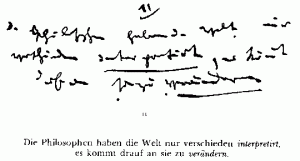Among the most quoted of sentences in Karl Marx’s writings is certainly his eleventh thesis from Thesen über Feuerbach [Theses on Feuerbach]:
Die Philosophen haben die Welt nur verschieden interpretiert; es kömmt aber darauf an, sie zu verändern. [The philosophers have only interpreted the world in various ways; but what matters is changing it.]
 Marx comes to this conclusion really at the very end — the final sentence — of his Theses. So it might be worth considering why he had to write ten prior theses in order to draw a conclusion that has since stood on its own. Does it stand on its own? Of course not.
Marx comes to this conclusion really at the very end — the final sentence — of his Theses. So it might be worth considering why he had to write ten prior theses in order to draw a conclusion that has since stood on its own. Does it stand on its own? Of course not.
To see whether Marx can shed some light on this conclusion, we can begin by recalling why Marx wrote the Theses. Marx wrote the Theses in order to contest the blind atheism rampant among left wing intellectuals in the 1840s, including Ludwig von Feuerbach, that Marx found as silly and unsound as the theism they believed they were rejecting. In his Das Wesens des Christentums  [Essence of Christianity] (1841), Feuerbach had adopted the mindless (because mechanical) methodology of taking each Christian dogma, one by one, and showing how its true meaning could only be found in a materialistic interpretation of the dogma. So, for example, Feuerbach interpreted the Christian dogma of the incarnation, literally the enfleshment of God in Jesus, as, in fact, the deification of Man. He interpreted the dogma of the virgin birth as an elevation and honoring of womanhood; and so on. As Marx put it:
[Essence of Christianity] (1841), Feuerbach had adopted the mindless (because mechanical) methodology of taking each Christian dogma, one by one, and showing how its true meaning could only be found in a materialistic interpretation of the dogma. So, for example, Feuerbach interpreted the Christian dogma of the incarnation, literally the enfleshment of God in Jesus, as, in fact, the deification of Man. He interpreted the dogma of the virgin birth as an elevation and honoring of womanhood; and so on. As Marx put it:
Der Hauptmangel alles bisherigen Materialismus – den Feuerbachschen mit eingerechnet – ist, daß der Gegenstand, die Wirklichkeit, Sinnlichkeit, nur unter der Form des Objekts oder der Anschauung gefaßt wird; nicht aber als menschliche sinnliche Tätigkeit, Praxis, nicht subjektiv” [The chief defect of all hitherto existing materialism – that of Feuerbach included – is that the thing, reality, sensuousness, is conceived only in the form of the object or of contemplation, but not as sensuous human activity, practice, not subjectively].
Marx here objects to the failure of materialism to explore the way that practice shapes or gives rise to the object world. The clue to meaning, Marx says, is in the practices that give rise to the world, not in the bare material thing by itself. To be sure, materialists want to be objective; they don’t want their thought to determine the object. They want the object to determine thought. But, in Marx’s view, this entirely by-passes the role that practice plays shaping both the object and thought: “Feuerbach will sinnliche, von den Gedankenobjekten wirklich unterschiedene Objekte; aber er faßt die menschliche Tätigkeit selbst nicht als gegenständliche Tätigkeit” [Feuerbach wants sensuous objects, really distinct from the thought objects, but he does not conceive human activity itself as objective activity]. Were materialists genuinely interested in the practical production of Christianity, then they would explore how the practices of first century Palestinian Jews gave rise to this specific constellation of practices, experiences, and beliefs. But because they are only interested in ideologically asserting their materialism as a counter-dogma, they actually end up reproducing the structure of the idealism they claim they want to combat. Marx thus exposes the idealism in materialism. Materialists simply begin with a different idea, the idea of matter. But, writes Marx:
Die Frage, ob dem menschlichen Denken gegenständliche Wahrheit zukomme, ist keine Frage der Theorie, sondern eine praktische Frage. In der Praxis muß der Mensch die Wahrheit, d.h. die Wirklichkeit und Macht, die Diesseitigkeit seines Denkens beweisen. Der Streit über die Wirklichkeit oder Nichtwirklichkeit eines Denkens, das sich von der Praxis isoliert, ist eine rein scholastische Frage [The question whether objective truth can be attributed to human thinking is not a question of theory but is a practical question. Man must prove the truth — i.e. the reality and power, the this-sidedness of his thinking in practice. The dispute over the reality or non-reality of thinking that is isolated from practice is a purely scholastic question].
Thought is formed by practice. Therefore, any thinking that wishes to understand itself needs to grasp the practice by which it has been shaped. And herein Marx casts materialists and their atheism in a rather unflattering light. When they fawn after “objective truth” and fault religious believers for their “fables,” materialists are simply idealizing a different set of abstract principles; they are not exploring the practices from which all ideas gain their objectivity.
 The question then is not whether we change the world through our practice. We do, whether we want to or not. Whether we know it or not, the world is constructed by and changed by practice; and this change includes how we think about the world. Marx is calling for us to own up to the practical character of thought; not simply someone else’s thought, “their” thought, the thought of “those religious folk,” but our thought too. “Das gesellschaftliche Leben ist wesentlich praktisch. Alle Mysterien, welche die Theorie zum Mystizismus verleiten, finden ihre rationelle Lösung in der menschlichen Praxis und im Begreifen dieser Praxis” [All social life is essentially practical. All mysteries which lead theory to mysticism find their rational solution in human practice and in the comprehension of this practice].
The question then is not whether we change the world through our practice. We do, whether we want to or not. Whether we know it or not, the world is constructed by and changed by practice; and this change includes how we think about the world. Marx is calling for us to own up to the practical character of thought; not simply someone else’s thought, “their” thought, the thought of “those religious folk,” but our thought too. “Das gesellschaftliche Leben ist wesentlich praktisch. Alle Mysterien, welche die Theorie zum Mystizismus verleiten, finden ihre rationelle Lösung in der menschlichen Praxis und im Begreifen dieser Praxis” [All social life is essentially practical. All mysteries which lead theory to mysticism find their rational solution in human practice and in the comprehension of this practice].
But once we recognize this bi-directional relationship, we are no longer free to fault the religious for their lack of objectivity. All thought is necessarily, by definition, “objective” in light of the practices that give rise to it. Do you want to change your world? Then change your practices? Do you want to understand why you think the way you do? Then examine the practices that have given rise to your thought.
All of us know how incredibly boring it is to have friends or students tell us, or tell one another, “well, that is your view. Everyone has a right to their opinion.” Each to his or her own. “Depending on your viewpoint . . .” No. No. No.
Down this road lies radical individualism and solipsism, not radical socialism and collectivism. We have the power to critically explore the practices that give rise to different thought forms. And we have the power to transform our practices to shape a new regime of thought. The two are related. But we do not have the power to fault beliefs because they are not objective; to the contrary, they are by definition objective. The only question is: what are the practices that have given rise to this or that object.
Das Höchste, wozu der anschauende Materialismus es bringt, d.h. der Materialismus, der die Sinnlichkeit nicht als praktische Tätigkeit begreift, ist die Anschauung der einzelnen Individuen in der “bürgerlichen Gesellschaft” [The highest point reached by contemplative materialism, that is, materialism which does not comprehend sensuousness as practical activity, is contemplation of single individuals and of civil society].
Ironically, therefore, Marx’s conclusion is not itself a practical activity, but a theoretical claim. The philosophers believe that their thinking gives rise to the world. They are mistaken. Practice gives rise to the world. Now, if this is always so, then we can ask: what kind of world is it that you want to practically create?
As a coda, I find it troubling here in Bosnia and Herzegovina that left-leaning activists have read so little of Karl Marx. Often our grasp of Marx is terribly shallow. Here in Marx’s Theses on Feuerbach is an illustration of exceptionally rigorous social theory. Unfortunately, however, it is quoted without understanding, as though the person citing it is completely unfamiliar with Feuerbach, Hegel, or even Marx; as though it were a religious dogma, a point of theological orthodoxy, rather than a contestable theory about how our world works.
Now, of course, all of us quote Marx; and we often quote him out of context. But, in this specific instance, we often quote him against his actual meaning. Marx is inviting us to revolutionary practice. That is true. But this is not because some people think, while others do. All people do. All people think. But not all people recognize that their doing structures their thinking. And not all people recognize that their thinking structures their doing.
Marx’s objection to the materialists and atheists of his day is that they failed to recognize that their atheism no less than the theism of first century Palestinian Jews was shaped by practice. Revolutionary practice depends on our recognition that all thought — and not simply so-called radical thought — is practical.